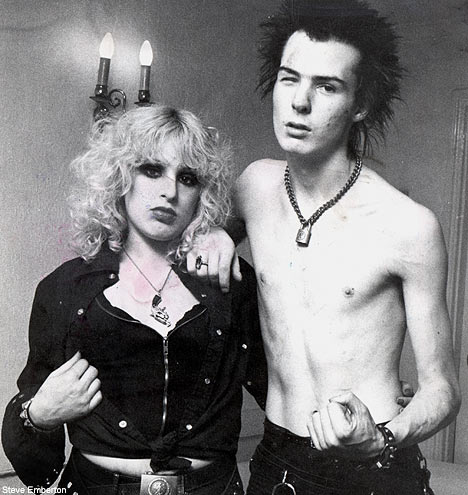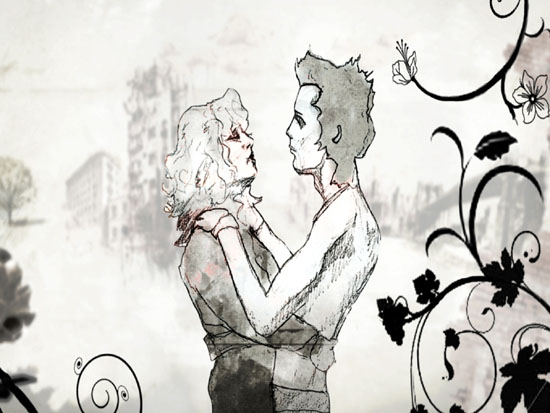In a world supposedly transfixed by celebrity, now is maybe as good a time as any to exhume the corpses of punk’s first couple Sid Vicious and Nancy Spungen and re-examine the nature of their violent and tragic deaths. Back in the day, the demises of the star-crossed lovers Sid and Nancy were acknowledged mutedly by a public who would soon be transfixed by the shooting of a fictional Texan called JR. For most, as for the police at the time, it was considered an open/shut case, the tragedy of a pair of stupid junkies too fucked to know what they were doing imploding spectacularly and buying into the "live fast, die young, leave a good-looking corpse" rock ‘n’ roll myth. Nobody, it seemed, would miss Nancy, a spectacularly awful person by all accounts. And Sid, checking out whilst still young, dumb and beautiful, instantly made him the poster child for a disenfranchised and fallen generation. Athena would profit from punk’s loss.
But did Sid really stab Nancy in a violent, drug-addled rage or did somebody else do it? This is what Who Killed Nancy? sets out to discover. Add to the simple premise director Alan Parker, and it promises to be an intriguing couple of hours. Though of course, that’s not Sir Alan William Parker CBE, the celebrated British director responsible for Bugsy Malone, Midnight Express and Pink Floyd The Wall; instead we get Alan G. Parker, a little known Sex Pistols obsessive who’s written a book or two on punk – an author, yes, but it soon becomes apparent this Parker has never stepped behind a camera before. Though he clearly lives and breathes his subject and has spent countless hours researching and accumulating material (he interviewed 182 people for this picture), what we actually get is a confusing, convoluted mess of a documentary, a jumbled mass of information and anecdotes with seemingly no direction, climaxing disappointingly with the sort of evidence unlikely to have Scotland Yard beating down his door with offers of a job.
"I have strong views on Sid And Nancy so I wanted to make the ultimate, last word movie," says Parker. "It will be 100 minutes of facts and at the end we’re going to turn round and let the audience be the jury."
Which is strange, because what I watched was 100 minutes of 50-something former wild children trying to recall an incident that took place over 30 years ago in the Chelsea Hotel whilst they were off their pricks on drugs and booze. The documentary is also light on these apparent facts. Honestly, the whole thing feels flabby, and could easily have been trimmed to half an hour’s material, were Parker not clearly overawed by the fact he’s talking to real punks, who were really there, who really knew Sid. Incidentally, though he himself wasn’t there, this fact doesn’t deter Parker from putting himself in the film and questioning himself about what might have happened that night. The sight of his well-nourished face and strong Blackburnian accent fits incongruously with all the gaunt cadavers with Cockney and New York brogues, and from the moment he first appears you know you’ve travelled into a World of Wrong and it’ll be nearly impossible to get the nightbus back from there.

There are admittedly some fishy circumstances regarding this case. Firstly, the job the police did was sloppy. With a couple of dead addicts on their hands, the NYPD shut what appeared to be a routine murder investigation without really interviewing anybody or fingerprinting properly. Then there was the fact Sid was so out of his skull on strong barbiturates that it would probably have been impossible for him to lift an eyebrow, let alone a knife in anger. The imbibing of 30 Tuinal tablets, we’re informed, could slay an elephant. Finally, Sid had been given $25,000 in cash for his version of Ol’ Blue Eye’s ‘My Way’ by that nice Richard Branson, head of Virgin records at the time: money which Nancy had been flaunting around the streets of Manhattan days before and on that particular night, and which had mysteriously disappeared by the morning of October 12th 1978, when she was found slumped dead in her pants in the hotel bathroom.
Without deviating from the core of his mission, Parker manages to fluff it. Interview after interview becomes increasingly tedious (and often irrelevant), and the only visual ‘relief’ comes in the form of the three or four photos the director is presumably granted permission to use, with cheap graphics masquerading as expensive polluting the screen intermittently. And the soundtrack, without a Sex Pistols number in sight, is abominable. Aside from the disastrous presentation of information, the film is offensive to look at and listen to. Characters like John Lydon, Jah Wobble, Malcolm McLaren, Richard Branson, or Sid’s girlfriend at the time of his own death, Michelle Robinson, are conspicuous by their absence. The nearest the filmmaker gets to his subject is Sid’s mum, Anne Beverley, who he met before she killed herself in 1996. Beverley, many believe, was indirectly responsible for killing Sid, real name John Simon Ritchie.
"Before she died, Anne told me to clear her son’s name," says Parker, who finds it difficult to contain his contempt for her during his film. And how far does he get with this behest from beyond the grave? If one bad hand-drawn picture that looks like Gollum from Lord of the Rings supposedly of a person whose surname nobody can remember is the answer to that earnest appeal, then the Who Killed Nancy? director is clearly no Nancy Drew. At the end of the day Who Killed Nancy? feels like a rhetorical question falling on deaf ears. Does anyone really care who killed Nancy? No, that wouldn’t have made a good movie either.



